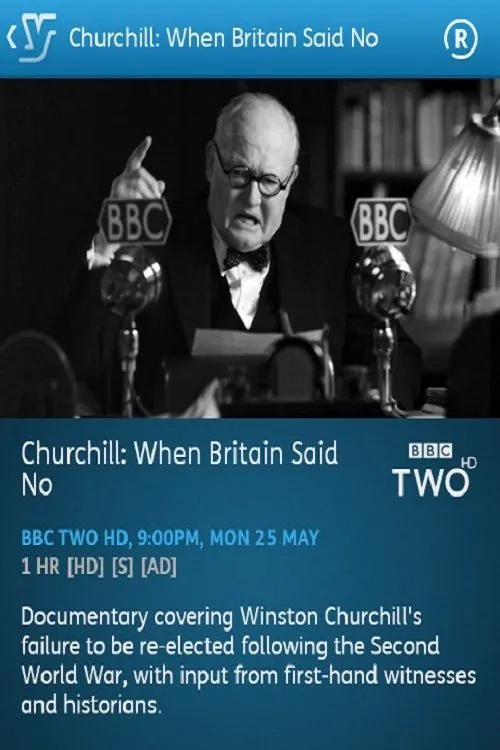Churchill: When Britain Said No

Trama
Churchill: When Britain Said No is a documentary that sheds light on one of the most unexpected outcomes of the 20th century: Winston Churchill, the legendary leader who guided Britain through the tumultuous years of World War II, was voted out of office mere months after the Allied victory in 1945. This documentary examines the events that led to the Conservative Party's crushing defeat in the General Election of that year, a loss that marked the end of Churchill's time as Prime Minister. To understand the magnitude of this result, it's essential to recall the context in which the 1945 election took place. Britain had suffered devastating losses during World War II, with millions displaced, injured, or killed, and the country lay in ruins. But in the face of such adversity, Churchill emerged as a beacon of hope and resolve, rallying the nation with his oratory skills and unwavering leadership. His famous speeches, imbued with a sense of determination and courage, inspired the British people to endure the hardships of war and ultimately contributed to the Allied victory. However, the election that catapulted Churchill to the helm of the country was not one of his choice. Following Neville Chamberlain's resignation in May 1940, Churchill, then the First Lord of the Admiralty, took over as Prime Minister, tasked with guiding Britain through the treacherous waters of World War II. Over the next few years, Churchill's leadership was put to the test time and again, as Germany launched a series of devastating attacks on British cities and ports. Despite the odds, Churchill steered the country through some of its darkest days, and his leadership played a significant role in convincing the United States to enter the war on Britain's side. But the long years of conflict, coupled with the devastating impact it had on the British people, began to take a significant toll. As the war drew to a close, Churchill's leadership was facing growing criticism from within his own party. Many of the wartime coalition politicians were increasingly concerned about the economic and social implications of the war, particularly the devastating effects of bombing raids on British cities and the strain on the country's resources. Additionally, Labour Party politicians, who had been a part of Churchill's wartime coalition, became increasingly frustrated with the Conservative leadership's failure to address pressing social and economic issues. They had grown weary of the government's reluctance to implement meaningful reforms, particularly in the areas of housing, healthcare, and education. Meanwhile, Clement Attlee, a rising star within the Labour Party, began to capitalize on these growing concerns, positioning his party as a more progressive alternative to the Conservatives. Attlee and his colleagues campaigned tirelessly across the country, promising sweeping reforms and a more equitable distribution of resources. Churchill, for his part, was reluctant to acknowledge the extent of the public's discontent. He remained convinced that his wartime leadership would be enough to secure him a mandate for continued rule, but his confidence was misplaced. The Conservative Party, divided and demoralized, found itself woefully unprepared for the onslaught of criticism they faced from the Labour Party. As the election campaign reached its climax, Labour's momentum showed little sign of abating. Attlee's message of hope and change resonated with the British people, who were increasingly skeptical of the Conservative Party's ability to deliver on its promises. On July 5, 1945, millions of Britons flocked to the polls to cast their votes. The results were a crushing blow to Churchill and the Conservatives. The Labour Party, led by Attlee, secured an historic landslide victory, winning 393 seats to the Conservative Party's 213. Churchill's electoral defeat marked the end of his time as Prime Minister, a position he had held for the better part of the previous five years. Attlee's victory marked the beginning of a new era for Britain, one in which social and economic reforms would shape the course of the country's history. In the years that followed, Attlee's government implemented sweeping reforms, introducing the National Health Service, free education, and comprehensive welfare programs. These reforms went a long way in addressing the social and economic ills that had bedeviled Britain for so long. Churchill's defeat at the polls marked a turning point in his career, one that would see him transition from the role of Prime Minister to that of a respected elder statesman. But even in defeat, his legacy as a wartime leader remained unassailable. He continued to serve as Prime Minister until 1955, when, at the relatively young age of 80, he retired, leaving behind a legacy that would continue to inspire generations of politicians and world leaders.
Reseñas
Recomendaciones


